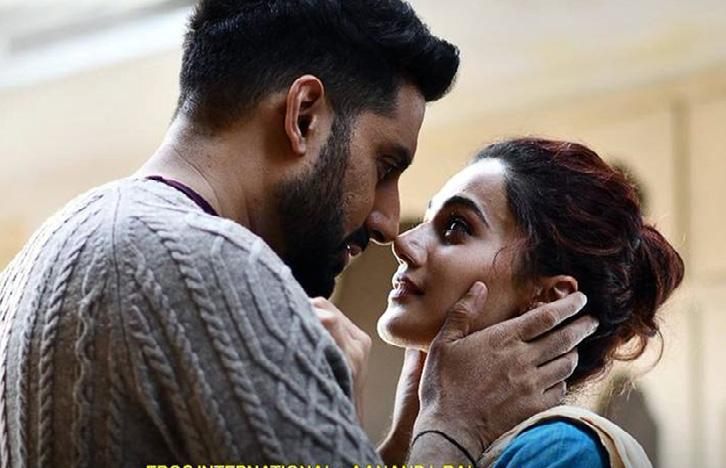
4 minute read
cineTALK
from 2018-09 Sydney (1)
by Indian Link
A MOVING BIOPIC, ASTUTELY TOLD
The character of Manto - a fragile man with a strong voice which he expresses through his writings - is palpable. Manto is every inch the person who spoke his mind through his writings, without fear. The humane side of the writer comes across strongly too, as he is loaded with shortcomings.
Rasika Duggal as Safia, his wife, is earnest and real. She essays her character effortlessly with restraint and conviction. Unfortunately, her performance is restricted by the sketchy script that limits her character.
Manto

STARRING: Nawazuddin Siddiqui, Rasika Duggal, Tahir Raj Bhasin, Tilottama Shome, Divya Dutta, Rishi Kapoor
DIRECTOR: Nandita Das HHHHH
Director Nandita Das’ Manto is a poignant and hard-hitting biopic about the controversial Indo-Pakistani Urdu short-story writer Sadat Hassan Manto. It is her tribute to Manto, albeit one she renders with honesty as she presents the celebrated writer with all his failings and greatness.
The film opens in Mumbai where a young and raring-to-go Manto is slowly but surely making his presence felt in the Indian film industry. With the
Partition breaking out, circumstances compel Manto to move to Pakistan, and his life changes.

The film portrays how circumstances can break a straightforward and talented man who depicted the society through his unapologetic writing.
The director succeeds in allowing the audience to be privy to the life of this author who lives in Lahore but has his heart belonging to Mumbai.
The narrative flows smoothly and the origination of some of his short stories like “Toba Tek Singh”, “Khol Do” and “Thanda Gosht” are successfully depicted.

Like every character-driven film, this film too moves at a slow pace, but manages to keep you engrossed. The drama is in the inner turmoil within the character. You can feel Manto’s frustrations as he feels incapacitated when in Lahore, and this is enhanced by the circumstances and times he lives in. The film touches your heart especially in the scene where he says, referring to Mumbai, “My father is buried there, my mother is buried there, and my son Arif too is buried there, but I can’t call that place my country.”
The dialogues strike the right chord and are mostly Manto’s own words. They are poetic and hard-hitting. An anguished Manto lashes out at the judge when accused of obscenity in his writings. “My stories mirror the society. If you don’t like the mirror, what can I do?”
Nawazuddin Siddiqui plays Manto with ease in an author-backed role.
Tahir Raj Bhasin as Manto’s close friend, actor Shyam delivers a strong performance and leaves an indelible impact.
In cameos, Divya Dutta as one of the characters of Manto’s short stories, Rishi Kapoor as a Parsi producer, Ila Arun as Jaddan Bai and the actors who play Toba Tek Singh and Ashok Kumar, deliver power-packed performances. The film will appeal to people who love history and are well-versed with Manto’s writings. The film enables you to travel back in time as cinematographer Kartik Vyas’s lens captures and recreates the era replete with sepia tones to perfection. The atmospheric lighting further adds to the authenticity.
The mellifluous and mournful score by Zakir Hussain imparts an interesting dimension to the narrative.
Overall, Manto, rooted in history, is a treat to watch.
LOVE IS ALL VERY WELL, BUT… rebound, you wish someone would slap this unapologetic self-server hard. Fate does that. The trouble with a pleasure-seeker like Rumi is, she is given a lot of leeway by the people around her. Her Punjabi joint family consternation at her sickeningly self-gratifying behaviour with Vicky, comes through in spurts of hurt and indignation.
Not that Rumi cares. She is arguably the most annoyingly self-absorbed romantic heroine seen on screen. Vicky Kaushal as her cheesy DJ lover has worked hard on looking his part. The hair, the clothes, the body language - all exude a sense of self-limiting rebellion. It is never very clear whether the passion between Vicky and Rumi is all about sex, or something more.
Manmarziyaan
STARRING: Abhishek Bachchan, Tapsee Pannu, Vicky Kushal
DIRECTOR: Anurag Kashyap
Imagine if Mani Ratnam had sex in mind for Moun Ragam. Yes, the same story that Sanjay Leela Bhansali made into Huma Dil Chuke Sanam about a marriage of inconvenience, where the kind patient husband desists from consummating the marriage until the wife comes out of her earlier relationship.
Imagine if the wife can’t come out of her stuporous obsession with her first love because, hell, the sex with Vicky (Kaushal) is too good.
The girlfriend-wife is played by Tapsee Pannu who seems to get more confident with every film. Her Rumi is no walkover for sure. Nor is it someone you would want as your wife… or your son’s wife. She is an unabashed epicurean, and the fact that she can play this superannoying selfish woman without making us cringe is in equal measures a triumph of writing (Kannika Dhillon) and performing.
Take the sequence where Tapsee’s Rumi rides a mo’bike to her future husband’s home and tells him, sorry, she can’t marry him. But hey, she can talk to him on Facebook. And off she rides.
Outrageously self-absorbed Tapsee plays Kangana’s small-town harridan from Tanu Weds Manu multiplied by 10. She is vixenish yet spontaneous, arrogant in her selfishness and yet not unlikeable. Tapsee brings out all the contradictions in her character. She spares us none of Rumi’s churlishness. By the time she heads to Kashmir for her honeymoon with her husband on the
While Tapsee and Vicky give bust to their robust parts, it is Abhishek Bachchan, whose quiet character creates a space in the heart of the plot and lodges itself in the library of the luminous by respecting the character’s need to remain noble without seeming over-sweetened or simply stupid. Manmarziyan takes the traditional love triangle to a new level of expression, articulating an idiom that cannot entirely avoid tedium. After Rumi marries Robbie the narrative runs out of steam. There are repetitive scenes in the secondhalf which could do with some serious pruning. In spite of its flawed flow due to its extended length, Manmarziyan is a winsome romantic tale which dares to ask a very basic question from diehard romantics: love is all very well, but what else?

Subhash K Jha









